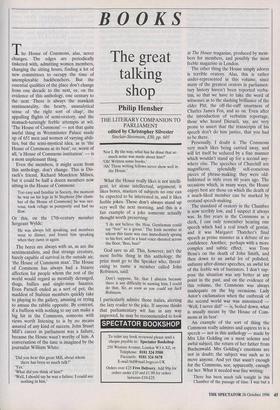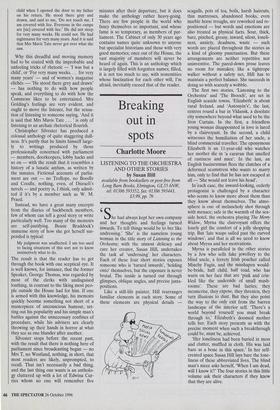BOOKS
The great talking shop
Philip Hensher
THE LITERARY COMPANION TO PARLIAMENT edited by Christopher Silvester Sinclair-Stevenson, £30, pp. 605 The House of Commons, alas, never changes. The edges are periodically tinkered with, admitting women members, changing the sitting hours, finding a lot of new committees to occupy the time of unemployable backbenchers. But the essential qualities of the place don't change from one decade to the next, or, on the evidence of this anthology, one century to the next. There is always the mawkish sentimentality, the hearty, unanalytical sense of 'the right sort of chap', the appalling flights of semi-oratory, and the stomach-turningly feeble attempts at wit. `The House of Commons' — not that quite useful thing in Westminster Palace made up of 651 men and women of varying abili- ties, but the semi-mystical idea, as in 'the House of Commons at its best', or, worst of all, 'a House of Commons institution' — is a most unpleasant thing.
Even the members, it might seem from this anthology, don't change. This is Dis- raeli's friend, Richard Monckton Milnes, but it could be half a dozen members now sitting in the House of Commons:
Too easy and familiar in Society, the moment he was on his legs in St Stephens [the cham- ber of the House of Commons] he was ner- vous, took refuge in pomposity and had no flow.
Or this, on the 17th-century member Sergeant Wylde:
He was always left speaking, and members went to dinner, and found him speaking when they came in again.
The bores are always with us, as are the sentimentalists, and that strange creature, barely capable of survival in the outside air, `the House of Commons man'. The House of Commons has always had a bizarre affection for people whom the rest of the world would regard as mentally deranged, thugs, bullies and single-issue fanatics. Even Parnell ended as a sort of pet; the maddest of Stalinist members quickly take to playing to the gallery, amusing or trying to amuse the rabble opposite. By contrast, if a buffoon with nothing to say can make a big hit in the Commons, someone with views worth listening to is by no means assured of any kind of success. John Stuart Mill's career in parliament was a failure, because the House wasn't worthy of him. A conversation of the time is imagined by the journalist William White:
`Did you hear this great Mill, about whom there has been so much talk?'
`Yes.'
`What did you think of him?'
`Well, I should say he was a failure. I could see nothing in him.'
`Nor I. By the way, what has he done that so much noise was made about him?'
'Oh! Written some books.'
'Ali! These writing fellows never show well in the House.'
What the House really likes is not intelli- gent, let alone intellectual, argument; it likes bores, masters of subjects no one can be expected to be interested in, and it likes feeble jokes. These don't always stand up very well the next morning, and this is a fair example of a joke someone actually thought worth preserving:
`I do not believe the Hon. Gentleman could say "boo" to a goose.' The Irish member at whom this taunt was cast immediately sprang to his feet, and in a loud voice shouted across the floor, 'Boo, boo!'
God save us all. This, however, isn't the most feeble thing in this anthology; the prize must go to the Speaker who, threat- ening to name a member called John Robinson, said: Don't suppose, Sir, that I abstain because there is any difficulty in naming him; I could do that, Sir, as soon as you could say Jack Robinson.
I particularly admire those italics, alerting the lazy reader to the joke. If anyone thinks that parliamentary wit has in any way improved, he may be recommended to look at The House magazine, produced by mem- bers for members, and possibly the most feeble magazine in London.
The other thing the House simply adores is terrible oratory. Alas, this is rather under-represented in this volume, since many of the greatest orators in parliamen- tary history haven't been reported verba- tim, so that we have to take the word of witnesses as to the slashing brilliance of the elder Pitt, the off-the-cuff smartness of Charles James Fox, and so on. Even after the introduction of verbatim reportage, those who heard Disraeli, say, are very prone to assert that the transcripts of his speech don't do him justice, that you had tobeersthoenraell P y, I doubt it. The Commons very much likes being carried away, and will let itself be seduced by a fine manner which wouldn't stand up for a second any- where else. The speeches of Churchill are magnificent, splendidly self-conscious pieces of phrase-making; they were old- fashioned in style even 60 years ago. The occasions which, in many ways, the House enjoys best are those on which the death of a much-liked member can be marked by orotund speech-making.
The standard of oratory in the Chamber is now terribly low, and I suspect it always was. In five years in the Commons as a clerk, I can only remember hearing one speech which had a real touch of genius, and it was Margaret Thatcher's final speech as prime minister in a debate of no confidence. Another, perhaps with a more complex and subtle effect, was Tony Benn's on the death of John Smith, and then down to an awful lot of polished, unfunny after-dinner speeches, an awful lot of the feeble wit of banisters. I don't sup- pose the situation was any better at any point in the past, and on the evidence of this volume, the Commons was always inadequate on the big occasions. Lady Astor's exclamation when the outbreak of the second world war was announced 'Well, I never did!' — is, boiled down, what is usually meant by 'the House of Com- mons at its best'.
An example of the sort of thing the Commons really admires and aspires to is a speech — not in this anthology — made by Mrs Llin Golding on a most solemn and awful subject, the return of her father from Buchenwald. Mrs Golding's emotions are not in doubt; the subject was such as to move anyone. And yet that wasn't enough for the Commons, nor, apparently, enough for her. What it needed was fine writing:
There has been much talk tonight in this Chamber of the passage of time. I was but a
child when I opened the door to my father on his return. He stood there grey and drawn, and said to me, 'Do not touch me. I am covered with lice. Everyone in the camps are [sic] covered with lice.' He did not sleep for very many weeks. He could not. He had nightmares for very many years. And it is said that Mrs Mavis Tate never got over what she saw.
Why this dreadful and moving memory had to be coated with the improbable and unfeeling tricks of rhetoric — 'I was but a child', or 'For very many weeks. . . for very many years' — and of women's magazine clichés — 'He stood there grey and drawn' — has nothing to do with how people speak, and everything to do with how the Commons likes to be entertained. Mrs Golding's feelings are very evident, and ought to move the listener, but the sensa- tion of listening to someone saying, 'And it is said that Mrs Mavis Tate . . . ' is only of listening to an archaic rhetorical flourish.
Christopher Silvester has produced a colossal anthology of quite staggering dull- ness. It's partly that he limits himself large- ly to writings produced by those professionally concerned with parliament — members, doorkeepers, lobby hacks and so on — with the result that it resembles a history of a lunatic asylum, as written by the inmates. Fictional accounts of parlia- ment are out — no Trollope, no Boodle and Coodle, nothing, even, of Disraeli's novels — and poetry is, I think, only admit- ted if it's by a member such as W. M. Praed.
Instead, we have a great many excerpts from the diaries of backbench members, few of whom can tell a good story or write particularly well. Too many of the memoirs are self-justifying. Bessie Braddock's immense story of how she got herself sus- pended is typical:
My judgment was unaffected. I am too used to facing situations of this sort not to know instinctively what to do.
The result is that the reader has to get through the book with one sceptical eye. It is well known, for instance, that the former Speaker, George Thomas, was regarded by most of the clerks with undisguised loathing, in contrast to the liking most peo- ple outside the House had for him. If one is armed with this knowledge, his memoirs quickly become something not short of a masterpiece of unconscious humour, set- ting out his popularity and his simple man's battles against the unnecessary confines of procedure, while his advisers are clearly throwing up their hands in horror at what they see as one blunder after another.
Silvester stops before the recent past, with the result that there is nothing here of parliament since broadcasting began — no Mrs T, no Westland, nothing, in short, that most readers are likely, unprompted, to recall. That isn't necessarily a bad thing, and the last thing one wants is an antholo- gy cluttered up with a lot of Edwina Cur- ries whom no one will remember five minutes after their departure, but it does make the anthology rather heavy-going. There are few people in the world who fancy themselves so important, and whose fame is so temporary, as members of par- liament. The Cabinet of only 30 years ago contains names quite unknown to anyone but specialist historians and those with very good memories; once out of the House, the vast majority of members will never be heard of again. This is an anthology which is largely filled with forgotten names; filled, it is not too much to say, with nonentities whose fascination for each other will, I'm afraid, inevitably exceed that of the reader.



















































































 Previous page
Previous page